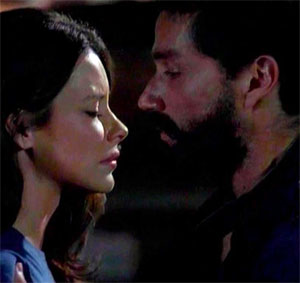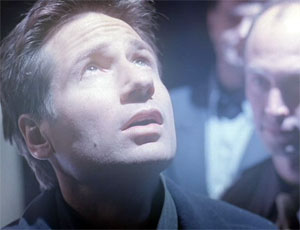
Typically when you watch the pilot episode of a TV series, you can guess what the rest of the series will bring you, at least in tone if not in plot. Occasionally, though, a great TV show will throw a twist into the middle of its run that completely changes the game. All your prior notions of where the show was going are wiped away, the status quo is changed fundamentally, and what you’re left with is a familiar series that suddenly has become unfamiliar as it leaps into the unknown. Here’s a look at seven TV shows that made just such a leap. Beware of spoilers for the listed series. And no, Fonzie jumping the shark doesn’t count.
1. Lost – “Through The Looking Glass”: Jack and Kate get off the island
 Lost began with the crash of Oceanic flight 815 onto a mysterious deserted island, presumably somewhere between Australia and California. The focus of the series shifted during the first three seasons between a monster made of black smoke, a shadowy group of malicious “Others”, and a network of hatches built by the Dharma Initiative. The overriding goal above all of those, though, was to get off the island. These survivors were stranded somewhere foreign and dangerous, and it seemed as though the series was designed to lead us through the castaways’ adventures on the island, dragging the story along until we learned whether and how they would be rescued at the end of the series’ run.
Lost began with the crash of Oceanic flight 815 onto a mysterious deserted island, presumably somewhere between Australia and California. The focus of the series shifted during the first three seasons between a monster made of black smoke, a shadowy group of malicious “Others”, and a network of hatches built by the Dharma Initiative. The overriding goal above all of those, though, was to get off the island. These survivors were stranded somewhere foreign and dangerous, and it seemed as though the series was designed to lead us through the castaways’ adventures on the island, dragging the story along until we learned whether and how they would be rescued at the end of the series’ run.
The writers ended the third season, however, with what they happily referred to as a “rattlesnake in the mailbox.” After three seasons of showing us flashbacks to the survivors’ pre-crash lives, we suddenly realized we were watching a flashforward that had Jack sporting an alarmingly Fidelesque beard after he and Kate somehow made their way home. How far in the future was this? How did they get off the island? Who else made it home? Why was Jack wanting to return to the island after everything they’d been through? These were the new questions that became more important than the simple question of whether rescue would come. By changing the course of the series midway, the producers pumped new life into the then-sluggish Lost and revitalized a hit series.
2. Battlestar Galactica – “Lay Down Your Burdens, Part 2”: One year later
 The conceit of Battlestar Galactica is a simple one: After wiping out nearly the entire human race, the robotic Cylons are pursuing the last survivors through space while the humans seek refuge on the lost, mythical planet Earth. The show was set up to be about the war on the run against the Cylons, and it presumably would progress in intensity until the humans eventually found Earth and made a final stand against the robots.
The conceit of Battlestar Galactica is a simple one: After wiping out nearly the entire human race, the robotic Cylons are pursuing the last survivors through space while the humans seek refuge on the lost, mythical planet Earth. The show was set up to be about the war on the run against the Cylons, and it presumably would progress in intensity until the humans eventually found Earth and made a final stand against the robots.
All that took a left turn at the end of season two, though, when Gaius Baltar was elected President and decided the humans would colonize a new Earth-like planet they’d found along the way. Having the humans planetside was a big change on its own, but then the series leaped one year forward. After a year of having Baltar as President and living in squalid conditions on New Caprica, the humans were becoming complacent. That’s when the long-absent Cylon fleet arrived and forced the humans to capitulate the war, at the risk of being annihilated. The year jump changed the whole dynamic of the series. When the show came back in the third season, characters and relationships had changed drastically from what we’d known prior to New Caprica, the human / Cylon balance had shifted, and nothing would ever be quite the same again.
3. Buffy the Vampire Slayer – “I Was Made To Love You”: Joyce Summers dies
 When Buffy the Vampire Slayer made the jump from movie to TV, it improved in every way. It became a deceptively deep and emotional series about a young girl with amazing powers and her struggles to balance her own life with the tasks of holding back the hordes of vampires, ghouls, and beasts in the night. The first few seasons saw Buffy and her friends doing all the things adolescents do, albeit against a backdrop of a nightmarish town built atop a Hellmouth. Buffy would kill whatever needed killing, and at the end of the day she was still a girl dealing with the pressures of growing up.
When Buffy the Vampire Slayer made the jump from movie to TV, it improved in every way. It became a deceptively deep and emotional series about a young girl with amazing powers and her struggles to balance her own life with the tasks of holding back the hordes of vampires, ghouls, and beasts in the night. The first few seasons saw Buffy and her friends doing all the things adolescents do, albeit against a backdrop of a nightmarish town built atop a Hellmouth. Buffy would kill whatever needed killing, and at the end of the day she was still a girl dealing with the pressures of growing up.
Buffy’s life crashed around her when her mother suddenly died in the middle of season 5. Buffy was left in charge of a little sister, as well as all the responsibilities and requirements of adulthood suddenly thrust upon her. The dynamic of the show quickly changed as Buffy was forced into a greater role of leadership, and the tone of the already dark series noticeably darkened even more. Buffy found herself at first incapable of handling all the necessities of being an adult balanced with being the Slayer, and her devotion to trying to be a good protector for her sister would eventually lead to her own death and rebirth.
4. Alias – “Phase One”: SD-6 Falls
 Alias began as an intensely goal-oriented series. In the pilot episode, Agent Sydney Bristow learned that she’d been tricked into working for the terrorist organization SD-6, rather than the CIA, which she’d been led to believe she worked for. From the beginning she tasked herself with burrowing as deeply as possible into the nefarious SD-6 with the intent of bringing it down from the inside. This was a task that required her to be constantly on guard with her double life, always wary in deceiving her SD-6 coworkers, and determined to accomplish a task that surely would take the full series’ run to complete.
Alias began as an intensely goal-oriented series. In the pilot episode, Agent Sydney Bristow learned that she’d been tricked into working for the terrorist organization SD-6, rather than the CIA, which she’d been led to believe she worked for. From the beginning she tasked herself with burrowing as deeply as possible into the nefarious SD-6 with the intent of bringing it down from the inside. This was a task that required her to be constantly on guard with her double life, always wary in deceiving her SD-6 coworkers, and determined to accomplish a task that surely would take the full series’ run to complete.
But, as it turned out, taking down SD-6 only took a season and a half out of the series’ five year run. In the middle of season two, Sydney learned that the CIA suddenly had obtained information about the terrorist organization’s structure and would be able to bring the whole group down with coordinated strikes around the world. And bring the group down, they did. With SD-6 gone, Sydney’s main driving goal was accomplished, and fans were left wondering what more the series could offer. Quite a bit, actually. The fall of SD-6 sent Alias in a completely new direction that eschewed the previous double agent angle in favor of a superbly constructed science fiction / espionage hybrid that has been dubbed “spy-fi” in recent years.
5. Babylon 5 – “Points of Departure”: Commander Sinclair is reassigned
 Babylon 5 began as a somewhat uneven foray into the science fiction genre. It was about a diplomatic space station run by Commander Jeffrey Sinclair and administrated by Earth. It acted as an interstellar United Nations, where alien races arbitrated deals and brokered treaties. The writing usually was engaging, though the first season consisted mostly of standalone episodic stories. There were hints at a larger story, but it seemed as if the bigger arc would come to us in bits and portions, while the majority of the series would be about Sinclair and his crew dealing with the day to day running of the station.
Babylon 5 began as a somewhat uneven foray into the science fiction genre. It was about a diplomatic space station run by Commander Jeffrey Sinclair and administrated by Earth. It acted as an interstellar United Nations, where alien races arbitrated deals and brokered treaties. The writing usually was engaging, though the first season consisted mostly of standalone episodic stories. There were hints at a larger story, but it seemed as if the bigger arc would come to us in bits and portions, while the majority of the series would be about Sinclair and his crew dealing with the day to day running of the station.
Season two began with a shocker, as we learned via voiceover that Sinclair had been reassigned, and a new commander was coming to the station. That commander was Captain John Sheridan, a more brash and charismatic military man who would end up changing the entire course of the series. Sheridan’s introduction to Babylon 5 opened a wealth of new story opportunities and injected new life into the series. Almost immediately after Sheridan’s assignment to the station, the series developed a major plot arc that took the focus away from the running of the station and placed it firmly in the realm of a metaphysical war with higher beings in the universe. Sinclair’s departure established that no one on Babylon 5 was safe, and Sheridan’s introduction affirmed that a new regime was in charge.
6. The X-Files – “Requiem”: Mulder is abducted
 For the majority of its run, The X-Files was about the paranormal investigations of FBI agents Fox Mulder and Dana Scully. Mulder was a devout believer in aliens and all things spooky due to the apparent alien abduction of his young sister Samantha when he was a boy. Scully played his foil, always logical and unbelieving of the supernatural explanations he presented.
For the majority of its run, The X-Files was about the paranormal investigations of FBI agents Fox Mulder and Dana Scully. Mulder was a devout believer in aliens and all things spooky due to the apparent alien abduction of his young sister Samantha when he was a boy. Scully played his foil, always logical and unbelieving of the supernatural explanations he presented.
Season seven ended with Mulder himself being taken away by aliens as doubtful boss Skinner watched in amazement. The eighth season began with Scully assigned to a new partner, John Doggett, as Mulder was still among the missing. Scully found herself in the position of being the believer to Doggett’s skeptic. The dynamic of the whole show shifted with the new duo heading up the X-Files under the leadership of new Deputy Director Kersh.
7. 24 – “Day Four: 6:00AM – 7:00AM”: Jack Bauer dies
 Jack Bauer is the benchmark by which action heroes are measured today. He fought for his family and his country for four seasons, always staying a step ahead of the bad guys. Simultaneously, 24 continually ratcheted up the stakes and heightened the tension with every new plot and story development. Just when it seemed that there was nothing left for the writers to throw at Jack… they killed him.
Jack Bauer is the benchmark by which action heroes are measured today. He fought for his family and his country for four seasons, always staying a step ahead of the bad guys. Simultaneously, 24 continually ratcheted up the stakes and heightened the tension with every new plot and story development. Just when it seemed that there was nothing left for the writers to throw at Jack… they killed him.
Of course, he didn’t stay dead. Season four ended with Jack faking his death in order to avoid assassination by the Secret Service to appease militant Chinese who believed Jack was responsible for a raid on their embassy. The first four seasons saw Jack often at odds with the Counter Intelligence Unit, but at the end of (and during) the day, he always had their resources backing him. With Jack apparently dead, all his connections were gone, and he was a lone agent on the run and in hiding. Season five opened with the world still believing him to be dead. It was then that the series did the unthinkable: as Jack returned to the living, three of the show’s key supporting characters fell in sudden and violent attacks. The losses of David Palmer, Michelle Dessler, and Tony Almeida rocked the show and shifted the focus to a new band of heroes while Jack’s mission became a personal one different from anything he’d tackled before.
What TV shows that took a sharp left turn did I miss in this list? Drop a comment with your thoughts.







What about “The Inner Light” episode of Star Trek:TNG?
That was an amazing episode
The Inner Light was an awesome episode, but it didn’t “change everything.”
I would make a strong case for the Season 1 Finale of Prison Break where they went from inside the prison to on the run. It definitely changed the series dramatically.
For “Buffy” I would say that the Season 3 finale had a far greater impact on the direction of the series. You lost a lot of major characters (Principal Snyder, Angel, Cordelia, Faith (mostly) as well as the dramatic change from high school to college.
The Buffy Episode you’ve got listed is called ‘The Body’, not ‘I Was Made To Love You’.
‘IWMTLY’ was about a guy who built himself a Female Robot, April, but, forgot to de-programme once he found himself a real girlfriend. April then came to Sunnydale, looking for Warren (her boyfriend/maker), and went a little haywire when she discovered Warren’s infidelity. This was the episode that led to the creation of the BuffyBot.
Before “Crossroads” parts 1 and 2 of Battlestar Galactica I’d have agreed that the year jump was the major turning point. I think that revealing that 4 of the major cast members (well, 3 of the major, and one relatively minor) were Cylons really changed the dynamics a lot.
Oh, and “Revelations.”
@Bek: Actually, Joyce dies at the end of “I Was Made To Love You.” “The Body” is about the aftermath of her death.
Hmmm. I thought “The Body” was when Buffy came home and found her dead. Did we actually see Joyce die in the episode before that? I thought we found out when Buffy found out. I’ll have to go back and look.
At any rate, I would also say the episode in BtVS where Angel first turns into Angelus was a big twist and game changer, even though the change was not permanent. It completely changed how Buffy and everyone else related to Angel and completely upended Buffy’s world and worldview.
Also, the episode where at the end Spike has the dream and realizes he is actually attracted to the slayer he has until now hated is a great twist and forever changes his character and relationship to the others.
And, not to stick on the Whedonverse TOO much but the episode where Angel signs them up to run Wolfram and Hart gave the rest of the show a different approach.
@ScottHK: The final scene in “I Was Made To Love You” had Buffy coming home and finding Joyce dead on the couch. The next episode, “The Body”, picked up from that moment and showed the aftermath of the death.
I do agree that taking over Wolfram & Hart was a game changer for Angel. The Angelus change and the Spike revelation, while big plot points, didn’t change the direction of Buffy forever. They introduced new elements, but the basic status quo and lives of most of the characters remained largely unchanged, aside from dealing with new crises presented by these things. But yeah, the Wolfram & Hart running definitely sent Angel along a completely new path.
How about the season finale of reaper?
It was weird to know that Sam might be the son of the devil (not confirmed because he’s a tricky guy) and his dad being alive after being buried. Not to mention Steve’s apparition as an angel; too bad they didn’t go further with Sam and his powers.
In terms of changing things, I would say that the episode (on Buffy) when Dawn first appeared changed things quite a lot, since everything “lived” in the previous years became completely different from the gang’s point of view.
But I agree with the fact that Joice’s dead did mean a change in the tone of the show.
Love these lists by the way!!
i died a little on the inside when i saw that episode of buffy.
@Beck actually Joyce died at the very end of I was made to love you. But the next episode focused on it more wihich was The Body
Maybe the death of L in Death Note because then you think Light will take over and Kira will rule the world. Although another L appears. The series then gets more darker.